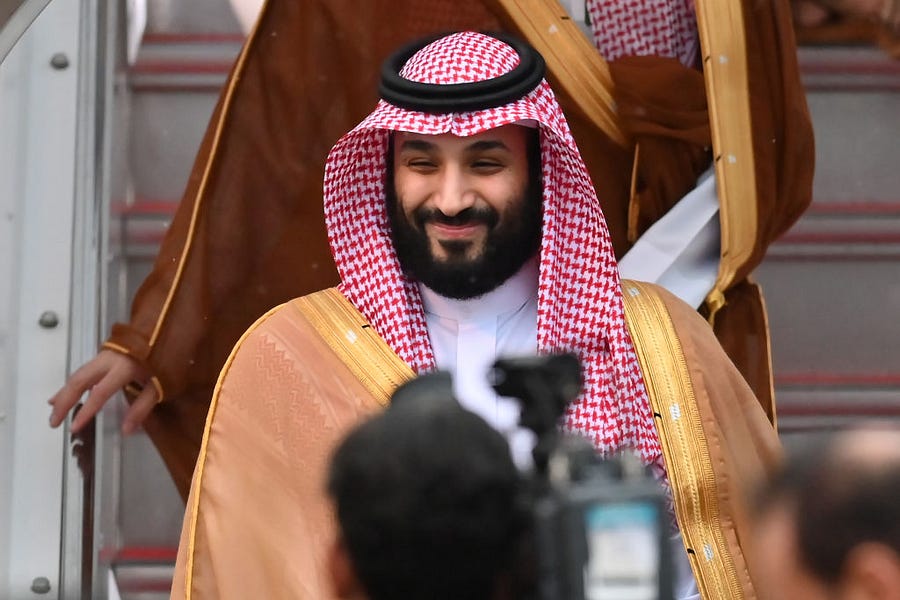President Biden’s visit to Saudi Arabia this week stands at the threshold of a new Middle East. If the visit’s purpose is simply to beg for increased oil production, then it will be a waste of time (the Saudis have already said they are already producing at near-capacity).
On the other hand, if the visit gives the U.S. the opportunity to establish a new relationship with Saudi crown prince Mohammed bin Salman (MBS), who is single-handedly transforming the character and culture of the Saudi kingdom, President Biden could be inaugurating a new era for the entire region.
MBS is the son of King Salman bin Abdulaziz, the reigning Saudi monarch, and is deputy prime minister and defense minister as well as crown prince. At age 36, he is in a position to guide a reform agenda for the future of the kingdom, as well as the Middle East, for another half-century—that is, if his single-minded drive to transform the kingdom will survive his enemies and opponents inside the royal family. His success will depend in large part on how the U.S. and the West responds to this once-in-a century opportunity to shape a powerful and influential ally—and shape a more stable and enlightened Arab Middle East.
A reformed Saudi Arabia with strong U.S. support would also become the keystone in the growing Israeli-Sunni alliance to block Iranian regional hegemony and derail its nuclear program, which remains the single gravest threat to peace and stability since 9/11.
Besides being designated crown prince, MBS has pushed his way to the front of Saudi politics by a combination of shrewd calculation and strong will, but also a realization that his country has to change with the times from a desert sheikdom made rich with oil to a modern post-industrial state.
Since becoming crown prince in 2017, he has steadfastly and almost solely pushed forward a reform of the Saudi economy and society. That includes investing Saudi wealth to move away from fossil fuels toward a more diverse, high-tech driven economy and future. Those plans include expanding rights for women and deradicalizing Saudi clerical power. In fact, his published manifesto, Saudi Vision 2030, includes the possibility of toleration and co-existence with other faiths, including Judaism and Christianity—a momentous concession from the man who will one day become the custodian of Islam’s two holiest sites, Mecca and Medina. In February 2020, MBS even arranged for his father to meet with a Jerusalem-based rabbi, David Rosen.
The changes have come at breathtaking speed. The Saudi religious police, who used to roam the streets of Riyadh accosting and even beating women who dared to defy strict Islamic custom, have largely disappeared from view. Women are now driving cars, and they no longer have to wear an abaya—the loose-fitting black garment worn over women’s clothing—in public. Capital punishment for minors has been abolished, as has flogging.
This secularizing and modernizing tidal wave has aroused opposition as well as support among ordinary Saudis. Its success ultimately hangs on the fate of the man who is pressing it forward.
Unfortunately, the mood in Washington regarding what’s happening has been breathtakingly shortsighted. While the Saudis remain our single largest purchaser of U.S. arms, policymakers obsess about Saudi involvement in the 9/11 attacks (when MBS was 16), the Saudi war in Yemen, and the murder of Saudi dissident and U.S. resident Jamal Khashoggi in 2018. The fact is opening the door to a U.S. accord with MBS can offer a path to investigating what really happened to Kaahoggi and how perpetrators can be punished.
Meanwhile, some worry growing ties with Saudi Arabia might offend Iran’s mullahs and endanger negotiations over renewing JCPOA. That is precisely why a bold diplomatic move is needed now.
The first important step, for example, in an improved U.S.-Saudi relationship would be getting the Saudis to sign on to the Abraham Accords, which can help to turn the growing Israeli-Sunni Arab alliance into the foundation of a new more peaceful Middle East.
On the other hand, if the U.S. continues to ignore the changes underway in Riyadh, we will see Saudi Arabia increasingly turning to China for the tools of modernization, including eventually military equipment.
It’s already begun, with the Saudis signing on with Chinese telecom equipment giant Huawei for building their 5G networks, which could severely set back U.S. cooperation with Saudi military and intelligence services. (Huawei networking equipment has been banned for use by U.S. companies since 2012 and the Trump administration added the company to a Commerce Department sanctions list in 2019.)
MBS’s critics in the U.S. ignore that his efforts at modernization have offended and alienated many of his more narrow-minded family members. If his reforms fail or falter, we could be looking at a 1979-style Sunni fundamentalist revolution, one that reinstates clerical control with collusion of reactionary royal family members.
In fact, we will be back where we were before 9/11, and the opportunity to change the character of the Middle East will be lost, at least for another generation. And it would create an opportunity for China to steal one more march on the U.S. and the West.
At the same time, the U.S. should have no illusions about MBS. He is no saint, and the reforms he feels compelled to make are driven by what he sees as Saudi self-interest, not humanitarian altruism. But we must also recognize that sometimes the best alliances are built not on shared values but on shared interests. The U.S. has a deep interest in a deradicalized Saudi Arabia, and gaining a rich and powerful partner for reshaping the Middle East—even transforming Islam. A constructive relationship with the new Saudi Arabia can open a new era of peace and stability in the region. It might even reverse a millennium of religious intolerance and hostility, if American policymakers have the will and vision to meet MBS at the threshold of history.
Arthur Herman is a senior fellow at the Hudson Institute, and author of The Viking Heart: How Scandinavians Conquered The World.






Please note that we at The Dispatch hold ourselves, our work, and our commenters to a higher standard than other places on the internet. We welcome comments that foster genuine debate or discussion—including comments critical of us or our work—but responses that include ad hominem attacks on fellow Dispatch members or are intended to stoke fear and anger may be moderated.
With your membership, you only have the ability to comment on The Morning Dispatch articles. Consider upgrading to join the conversation everywhere.